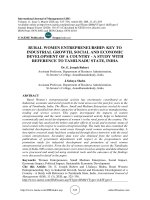Economic growth and economic development 245
Bạn đang xem bản rút gọn của tài liệu. Xem và tải ngay bản đầy đủ của tài liệu tại đây (108.78 KB, 1 trang )
Introduction to Modern Economic Growth
for some y f ∈ Y f for each f ∈ F. Let yˆf ∈ Yˆ f (p). Then,
X
X
p · yf ≤
p · yˆf ,
f ∈F
f ∈F
which implies that
p · yˆ ≤ p ·
(5.10)
Since, by hypothesis,
P
f ∈F
X
yˆf .
f ∈F
yˆf ∈ Y and yˆ ∈ Yˆ (p), we also have
X
p · yˆ ≥ p ·
yˆf .
f ∈F
Therefore, inequality (5.10) must hold with equality, so that
p · y f = p · yˆf ,
for each f ∈ F, and thus y f ∈ Yˆ f (p). This completes the proof of the theorem. Ô
This theorem implies that, given the assumptions that there are “no externalities” and that all factors are priced competitively, our focus on the aggregate production possibilities set of the economy or on the representative firm is without
loss of any generality. Why is there such a difference between the representative
household and representative firm assumptions? The answer is related to income
effects. The reason why the representative household assumption is restrictive is
that changes in prices create income effects, which affect different households differently. A representative household exists only when these income effects can be
ignored, which is what the Gorman preferences guarantee. Since there are no income
effects in producer theory, the representative firm assumption is without loss of any
generality.
Naturally, the fact that we can represent the production side of an economy by
a representative firm does not mean that heterogeneity among firms is uninteresting
or unimportant. On the contrary, many of the models of endogenous technology we
will see below will feature productivity differences across firms as a crucial part of
equilibrium process, and individual firms’ attempts to increase their productivity
relative to others will often be an engine of economic growth. Theorem 5.4 simply
says that when we take the production possibilities sets of the firms in the economy
231









